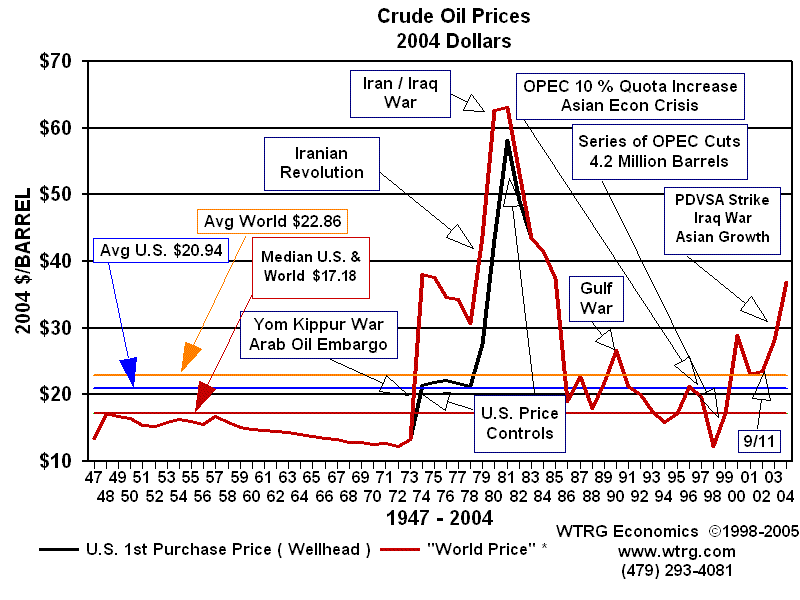
Iran, OPEC's second-largest producer, has stopped conducting oil transactions in U.S. dollars, a top Oil Ministry official said Wednesday, in a concerted attempt to reduce reliance on Washington at a time of tension over Tehran's nuclear program and suspected involvement in Iraq, report CNN. Also reported here. Mahmoud Ahmadinejad, Iran's President, has called the dollar a 'worthless piece of paper.'
Mahmoud Ahmadinejad, Iran's President, has called the dollar a 'worthless piece of paper.'
Iran has dramatically reduced dependence on the dollar over the past year in the face of increasing U.S. pressure on its financial system and the fall in the value of the American currency.
Iran's nuclear standoff with the United States, Europe, and other nations has led to considerable speculation of $100-per-barrel oil and $4-per-gallon gasoline in the US. Such high prices might kick off a worldwide energy crisis and recession. The West already suspects that Iran's uranium enrichment program is a cover for bombmaking. To try to put a stop to it, the United Nations Security Council could impose sanctions, or even riskier, the US or Israel might attempt to knock out Iran's nuclear facilities with an air or missile strike.
In retaliation, Iran could act against its own best economic interests and slash oil exports. Last September, the head of Iran's powerful Revolutionary Guards warned that "any sanction against Iran" could push the price of oil to $100 a barrel.
Iran's central bank has also been reducing its foreign reserves denominated in U.S. dollars, motivated by the falling value of the greenback and U.S. attempts to make it difficult for Iran to conduct dollar transactions.
U.S. banks are prohibited from conducting business directly with Iran, and many European banks have curbed their dealings with the country over the past year under pressure from Washington.
However, the U.S. has been wary of targeting Iran's oil industry directly, apparently worried that such a move could drive up crude prices that are already near record levels.
Iranian analysts say Tehran can withstand U.S. pressure as long as it can continue its oil and gas sales, which constitute most of the country's $80 billion in exports.
Oil is priced in dollars on the world market, and the currency's depreciation has concerned producers because it has contributed to rising crude prices and eroded the value of their dollar reserves.
"The dollar has totally been removed from Iran's oil transactions," Oil Ministry official Hojjatollah Ghanimifard told state-run television Wednesday. "We have agreed with all of our crude oil customers to do our transactions in non-dollar currencies."
Previously, reported in ChinaPost, even at US$115 a barrel, oil is priced too low, Iranian President Mahmoud Ahmadinejad said in comments published Saturday adding that the commodity "should find its real value."
"Oil at US$115 a barrel in today's market is a deceiving figure, oil is a strategic commodity and should find its real value," the state broadcaster's Web site quoted Ahmadinejad as saying.
Iran put pressure on other OPEC countries at the meeting to price oil in a basket of currencies, but it has not been able to generate support from fellow members — many of whom, including Saudi Arabia, are staunch U.S. allies.
It was warned two years ago, that that the world oil prices could triple if the West's stand-off over Iran's nuclear programme escalates into conflict. The Saudi ambassador to the US, Prince Turki Al-Faisal, said such an event could send prices spiralling from their current level of about $70 per barrel.
Many Iranians say they are being treated unfairly by the US and its allies, that they are subject to a double standard.
"Why is Israel allowed to have nuclear bombs while Iran is not allowed to have even as much as a research program that some experts believe might lead to building a nuclear bomb? Why are Israeli actions against the Palestinians and the Lebanese considered 'self defense,' while the actions of Palestinians and Lebanese are considered 'terrorist' acts? Why can Iran not intervene in Iraq when the US and its allies have already occupied the country? Why has Iran been deprived of its economic rights by [two-decades old] economic sanctions?"The US and its allies may well have answers to such questions.





No comments:
Post a Comment